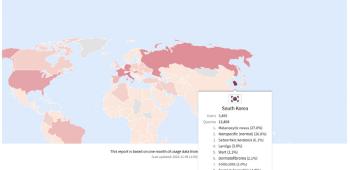Adverse side effects of colonoscopy in the elderly, predicting this...Development of risk measurement tools
May 20, 2025
|
As we enter an aging society, the age of patients who undergo colonoscopy every year is also increasing.
However, elderly patients over the age of 60 are more likely to develop side effects such as bleeding, perforation, and systemic complications after colonoscopy, depending on the degree of factors such as medication and physical deterioration they usually take.
In the meantime, a domestic research team recently developed an index that can predict the possibility of side effects when performing colonoscopy for elderly patients and published it as a paper.
A team of professors Shin Jin-young and Kim Min-jae of the Department of Gastroenterology at Yonsei University's Gangnam Severance Hospital began the study by recognizing the importance of a tool to accurately evaluate the risk of individual patients when conducting colonoscopy for elderly patients and determine whether and when to perform the procedure. The research team predicted that if the objectified measurement tool is verified, it will help balance the various benefits of colonoscopy and the risk of side effects after the procedure.
The research team defined it as a situation in which side effects occur when an elderly patient aged 60 or older visits the emergency room or is hospitalized unplanned within 30 days after receiving colonoscopy. In addition, a plan was prepared to objectify side effects-causing risk factors such as the degree of senility and the state of taking antiplatelet drugs and anticoagulants as scores.
The research team tracked and observed a total of 8154 patients over the age of 60 who underwent colonoscopy at Gangnam Severance Hospital from August 2017 to August 2022. At the same time, the FI-LAB (Freedom Index by Laboratory Findings) score was devised based on patient-specific blood test results and vital signs while reviewing the target group's emergency room visit and hospitalization records. The aging index was divided into three stages, low (<0.25), medium (0.25-0.40), and high (>0.40), depending on the measured value.
The research team also gave risk-causing scores to drugs taken normally that can cause side effects.
If you were taking aspirin and P2Y12 inhibitors belonging to antiplatelet drugs, you were given one point each, and you were given one point for using anticoagulants. In addition, the aging index was treated as 2 points at the intermediate level and 3 points at the high level.
After that, the research team finally divided the scores of aging indicators and the scores of drugs taken normally into three groups. The final score of 0 was in the low-risk group, 1 to 3 was in the medium-risk group, and 4 to 6 was in the high-risk group.
As a result of the study, out of 8154 people with an average age of 67.9 (60-94 years old), the probability of side effects occurring within 30 days was 1.4% (114 people). In addition, it was confirmed that aspirin, P2Y12 inhibitor, and anticoagulant, which are commonly used, each have an independent effect on the occurrence of side effects. Looking at the low aging index as a reference value, medium and high were found to be factors that independently influence the occurrence of side effects.
The final score calculated by summing the score of the aging index and the score of the usual drug also showed significant results in the three groups. In the low-risk group with a combined score of 0, only 13 out of 4,877 showed side effects, showing a 0.3% probability of occurrence, while the median and high-risk groups showed 64 out of 2922 (2.2%) and 38 out of 355 (10.7%), respectively. Compared to the low-risk group, the median risk group was about 8.4 times more likely and the high-risk group was about 45 times more likely to develop side effects.
Professor Shin Jin-young, who led the study, completed internal and external verification by applying the same method to 9,154 colonoscopy data collected from two other medical institutions from September 2022 to December 2023 to obtain similar results. In the past, procedures are often limited simply because they are old, but in fact, colonoscopy-related side effects are associated with factors other than age. Medical staff, as well as patients and caregivers, will be able to identify objectified indicators to help determine the direction of treatment, and furthermore, it is expected that it will be applied to patient management before and after treatment, which will also affect the reduction of complications and the reduction of medical resources."
The research paper was recently published in the online edition of the renowned international journal of gastroenterology 'Gut and River (IF 3.4)'.
|
This article was translated by Naver AI translator.















